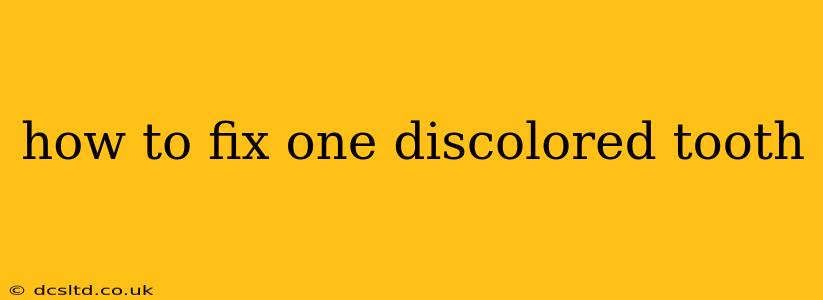A single discolored tooth can be a noticeable blemish, impacting your confidence and smile. Fortunately, there are several effective ways to address this cosmetic concern, ranging from simple at-home remedies to professional dental procedures. This guide will explore various options, helping you determine the best approach for your specific situation.
What Causes a Discolored Tooth?
Understanding the root cause of discoloration is crucial in choosing the right treatment. Discoloration can stem from various factors, including:
- Trauma: A blow to the tooth can damage the pulp, leading to internal discoloration over time.
- Medications: Certain antibiotics (like tetracycline) taken during tooth development can cause discoloration.
- Age: As we age, the enamel naturally thins, revealing the underlying dentin, which is a yellowish color.
- Genetics: Some individuals are naturally predisposed to having darker teeth.
- Poor Oral Hygiene: Neglecting proper brushing and flossing can lead to stains and discoloration from plaque buildup.
- Certain Foods and Drinks: Substances like coffee, tea, red wine, and tobacco can stain teeth over time.
How Can I Whiten One Discolored Tooth at Home?
While home remedies are unlikely to drastically alter the color of severely discolored teeth, they can offer some improvement for mild stains. These methods are best used as preventative measures or for minor discoloration:
- Baking Soda: Gently brushing your teeth with a paste of baking soda and water can help remove surface stains. However, overuse can damage enamel.
- Hydrogen Peroxide: Diluted hydrogen peroxide (3%) can be used as a mouth rinse. Again, use sparingly to avoid enamel erosion.
- Oil Pulling: Swishing coconut oil in your mouth for several minutes daily can purportedly improve oral health and whiten teeth, but scientific evidence is limited.
Can I Whiten Just One Tooth With Professional Whitening Treatments?
Professional whitening treatments are significantly more effective than home remedies. However, achieving precise whitening of only one tooth can be challenging. Most whitening techniques treat all visible teeth simultaneously. Your dentist can help determine the best approach, which may include:
- In-Office Whitening: This involves applying a high-concentration bleaching agent to your teeth, offering dramatic results in a single session.
- Custom-Fit Whitening Trays: Your dentist creates trays tailored to your teeth, allowing for at-home whitening using a less concentrated bleaching gel.
What Other Options Exist for Fixing a Discolored Tooth?
If whitening isn't suitable or effective, other options include:
- Veneers: Thin porcelain shells are bonded to the front surface of the discolored tooth, masking the discoloration and improving its shape and color. Veneers are a more permanent solution.
- Dental Bonding: A composite resin is applied to the tooth and sculpted to match the color of your surrounding teeth. This is less expensive than veneers but may not last as long.
- Dental Crowns: A crown completely covers the tooth, offering a highly durable and aesthetically pleasing solution. This option is usually reserved for teeth with significant damage or discoloration.
How Much Does Fixing a Discolored Tooth Cost?
The cost varies significantly depending on the treatment chosen and your location. Home remedies are inexpensive, while professional treatments like veneers and crowns can be considerably more expensive. Consult your dentist for a personalized cost estimate.
How Long Does it Take to Fix a Discolored Tooth?
Treatment duration depends on the chosen method. In-office whitening is quick, while custom-fit trays may take several weeks for optimal results. Veneers and crowns involve multiple appointments and take longer to complete.
What is the Best Way to Prevent Tooth Discoloration?
Prevention is key! Maintain excellent oral hygiene, including brushing twice daily, flossing daily, and using fluoride toothpaste. Limit consumption of staining substances like coffee, tea, and red wine. Regular dental checkups and professional cleanings are also essential for maintaining healthy teeth and preventing discoloration.
By understanding the various causes and treatments for a discolored tooth, you can work with your dentist to select the most appropriate and effective solution for your individual needs. Remember, open communication with your dentist is crucial to achieving a beautiful, healthy smile.
